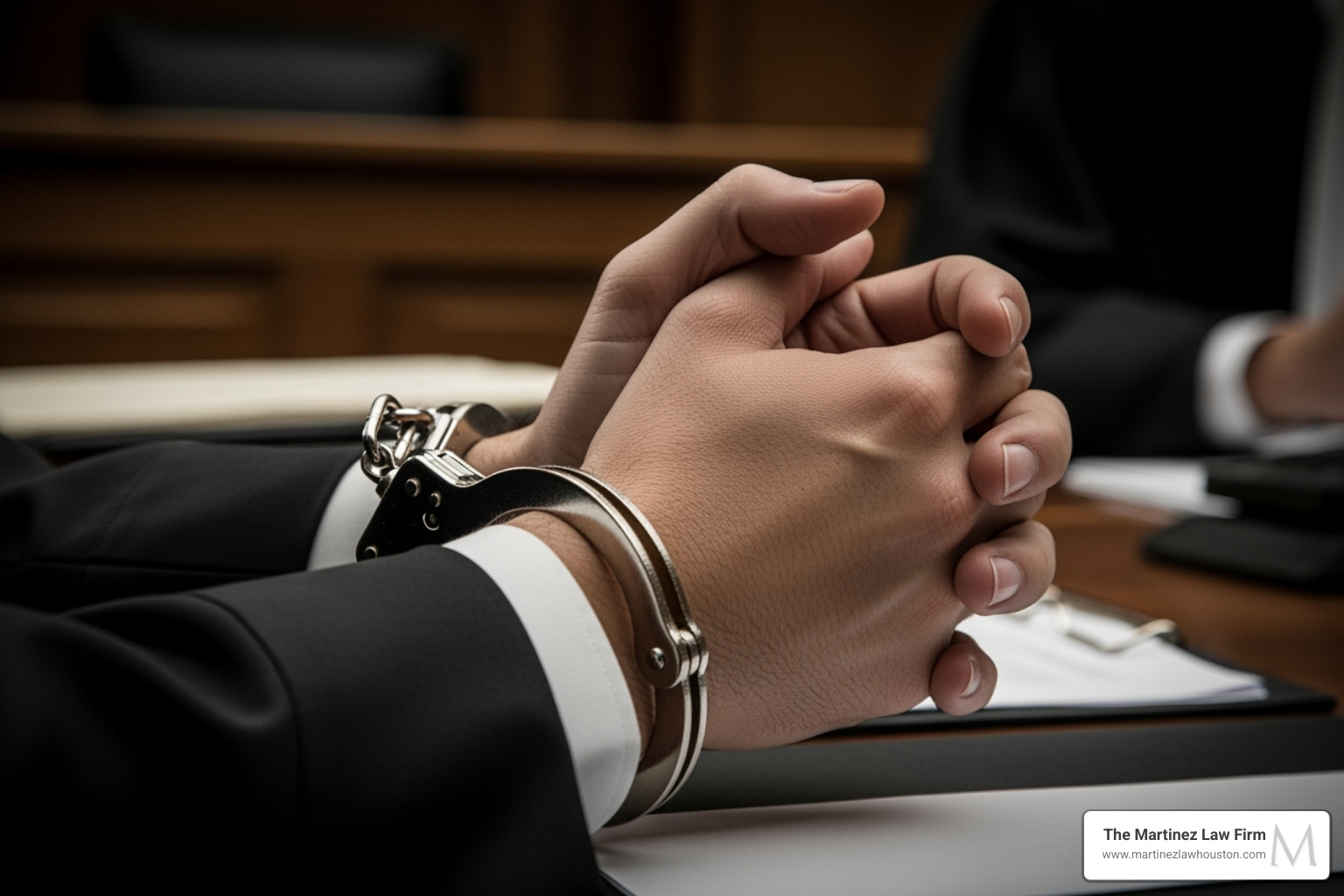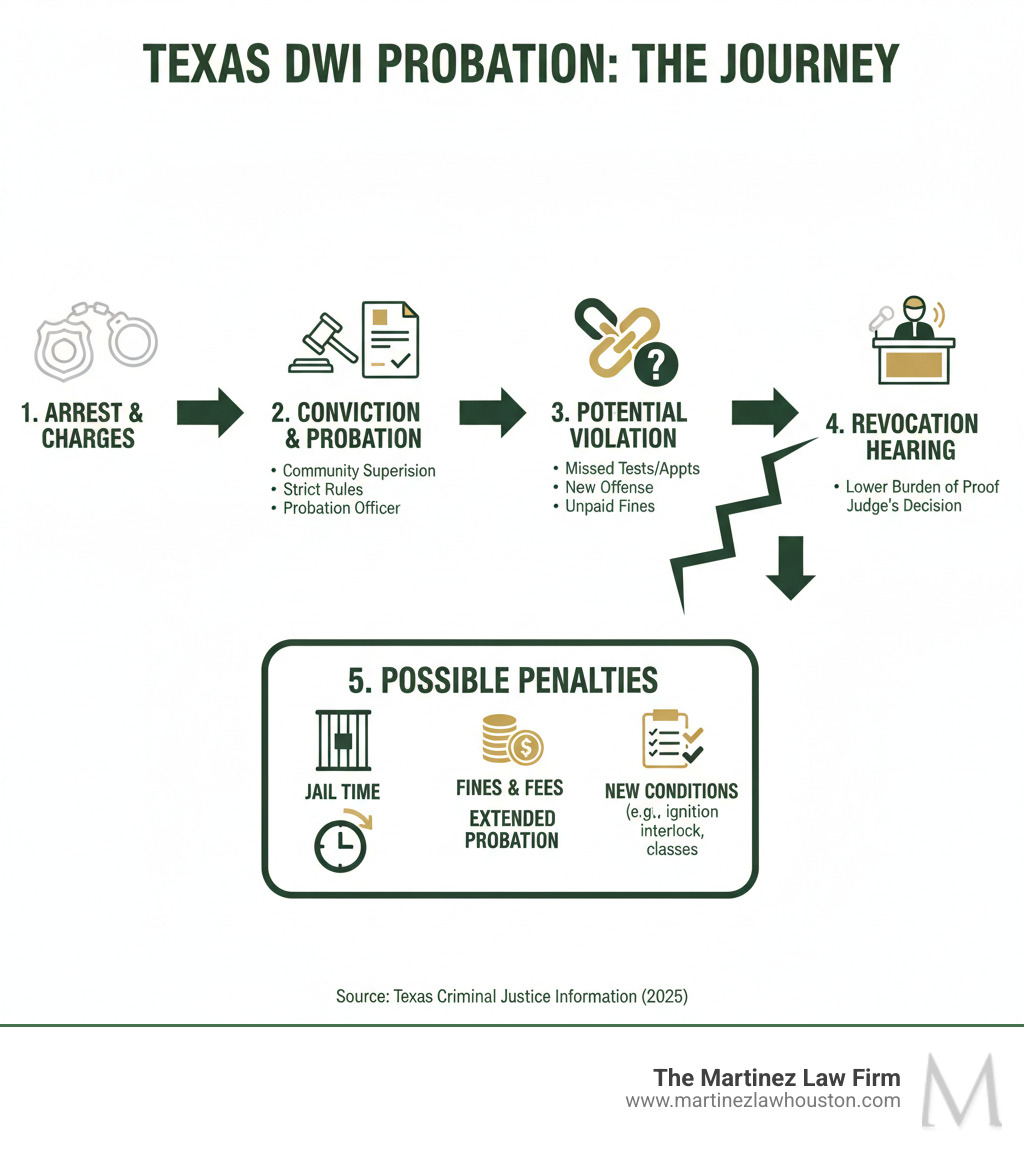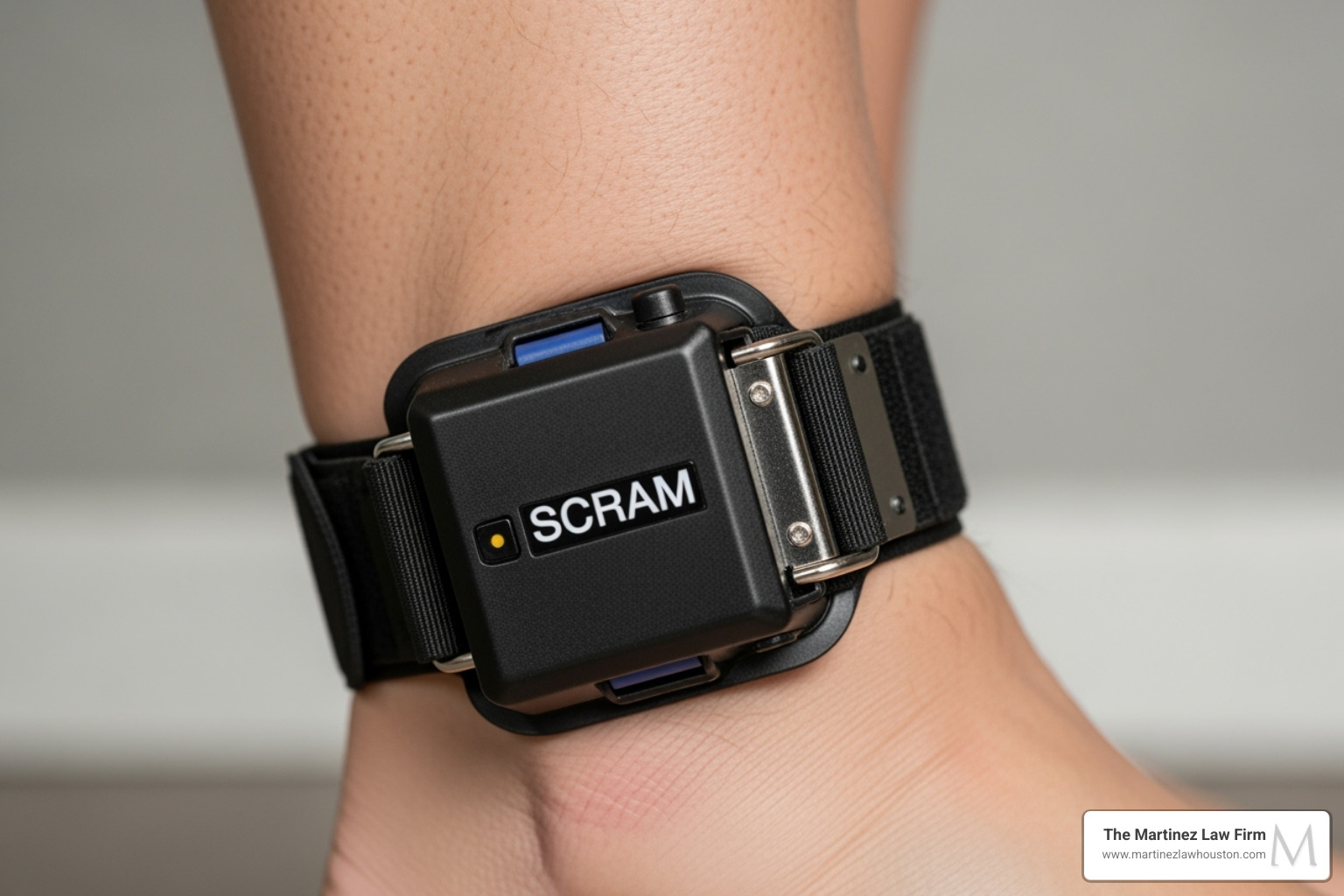Navigating DWI Probation Violations in Texas: Your Guide to Consequences
Understanding the Serious Stakes of a DWI Probation Violation

A dui probation violation texas can lead to jail time, extended supervision, and severe penalties that could upend your life. Probation, or “community supervision,” is a second chance to avoid jail after a DWI conviction, but it comes with strict rules. In Harris County, any misstep is taken seriously.
When you violate DWI probation, you face:
- Immediate Arrest: Your probation officer can file a Motion to Revoke, leading to a warrant. A judge may deny bond, keeping you in jail until your hearing.
- Lower Burden of Proof: The prosecutor only needs to prove the violation by a “preponderance of the evidence” (more likely than not), a much lower standard than “beyond a reasonable doubt.”
- Severe Penalties: You could face the original jail sentence you avoided, plus additional time for the violation itself. Time served for the violation does not count toward your original sentence.
- Dual Consequences for New Offenses: A new arrest triggers penalties for both the new charge and the probation violation.
I’m Herman Martinez, founder of The Martinez Law Firm. With over 25 years in the Texas criminal justice system as a former Chief Prosecutor for Harris County and a City of Houston Judge, I have unique insight into how these cases are handled. My goal is to use that experience to build the strongest possible defense and protect your freedom.

Understanding DWI Probation in Texas
When you’re convicted of DWI in Texas, “community supervision” (probation) is the court’s way of letting you avoid jail time, but with strict strings attached. You can stay in the community, keep your job, and live with your family, but you’ll be under constant court supervision.

Breaking any rule can lead to a dui probation violation texas and land you behind bars. The legal framework is outlined in the Texas Code of Criminal Procedure. For a first-time DWI in Harris County, probation typically lasts one to two years. The judge determines the length based on your case specifics and criminal history. For a full overview, see our resource on DWI Probation in Texas: What You Need to Know.
Common Conditions of DWI Probation
Every condition of your DWI probation is a legally binding order. Violating even one puts your freedom at risk. Common requirements include:
- Regular Check-ins: Mandatory meetings with your probation officer to verify compliance.
- Payments: Timely payment of all court-ordered fines, fees, and restitution.
- No New Offenses: You must not be arrested for any new crime, including minor ones.
- Abstinence and Testing: You are prohibited from consuming alcohol or illegal drugs, verified through random urine, breath, or continuous monitoring devices like a SCRAM ankle monitor.
- Mandatory Programs: Attending DWI education classes, victim impact panels, and any required substance abuse treatment.
- Ignition Interlock Device: For many, especially with a BAC of 0.15% or higher, you must install an ignition interlock device in your vehicle at your own expense. Learn more about DWI Lawyer: DWI Penalties.
- Other Rules: Completing community service, maintaining employment, adhering to travel restrictions, and avoiding people with criminal records.
These are not suggestions; they are court orders. Taking them seriously is the only way to avoid a dui probation violation texas.
Deferred Adjudication vs. Straight Probation
In Texas, there are two main types of probation: Deferred Adjudication and Straight Probation. The type you receive significantly impacts your criminal record.
With Deferred Adjudication, the judge defers a finding of guilt. If you complete probation successfully, the case is dismissed. You may then qualify for an Order of Non-Disclosure to seal your record from most background checks. However, if you violate probation, the judge can find you guilty and impose the maximum sentence for the original offense.
With Straight Probation, you are found guilty, but your jail sentence is suspended. The conviction remains on your record permanently. If you violate, the judge can revoke probation and make you serve the original suspended sentence.
Breaking Down the Differences
| Feature | Deferred Adjudication | Straight Probation (Suspended Sentence) |
|---|---|---|
| Finding of Guilt | No finding of guilt entered at the time of sentencing. Guilt is “deferred” pending successful completion of probation. | A finding of guilt is entered, but the jail sentence is “suspended,” and you’re placed on probation instead. |
| Eligibility | Generally for first-time offenders, often for misdemeanors. For DWI, it became more widely available after a 2019 law change, but typically not if you’re already on probation for another offense. | Available for a wider range of offenses, including some felonies, and after a guilty verdict or plea. |
| Record Sealing | Upon successful completion, the case is dismissed, and you may be eligible for an Order of Non-Disclosure to seal your record. This means the arrest and prosecution are not publicly available. | The conviction remains on your record. In some limited circumstances, expunction might be possible, but it’s rare for a DWI conviction. |
| Consequences of Violation | If violated, the judge can proceed with an adjudication of guilt and impose any punishment allowed by law for the original offense, including the maximum sentence. | If violated, the judge can revoke probation and impose the original suspended jail sentence. |
For DWI cases, deferred adjudication is generally only available to first-time offenders with a BAC below 0.15% and without a commercial driver’s license. The ability to avoid a permanent conviction makes deferred adjudication highly desirable, but the stakes for a violation are incredibly high.
What Constitutes a Violation of DWI Probation?
A dui probation violation texas occurs when you fail to comply with any court-ordered term of your community supervision. Even a seemingly minor slip-up can have serious consequences. Violations fall into two categories.

Technical violations are breaches of the administrative rules, such as missing an appointment with your probation officer, failing to pay fines, not completing community service, or traveling out of the county without permission. Substantive violations are more serious, as they involve committing a new criminal offense. Any new arrest, from theft to another DWI, is a substantive violation.
Either type of violation can trigger a Motion to Revoke Probation (MTR) or a Motion to Adjudicate Guilt (MTA), putting you at risk of jail time. For a comprehensive look at how violations are handled, see our guide on Probation Violation.
Getting a New DWI While on Probation
Getting arrested for a new DWI while on probation for a prior one is the most serious dui probation violation texas you can commit. This creates two simultaneous legal battles: the new DWI charge and the probation violation.
Your probation officer will file a Motion to Revoke Probation, and a judge in Harris County will likely issue an arrest warrant and may deny bond, meaning you could sit in jail until your hearing. At the same time, you face a new DWI charge, which prosecutors will pursue aggressively. The burden of proof for a probation violation is low—the prosecutor only needs to show it’s “more likely than not” that you were arrested for DWI to prove the violation. If your probation is revoked, you could serve your original sentence and then face additional penalties for the new DWI conviction. Immediate action is critical; for guidance, visit our page on DWI Arrest in Houston: What You Need to Know.
Consequences of a Failed Drug Test for a DUI Probation Violation Texas
Failing a drug or alcohol test is a clear-cut dui probation violation texas. Your probation terms require complete abstinence, and a positive test is direct evidence of a violation. In Harris County, probation officers use urine analysis (UA), breathalyzers, and continuous monitoring devices like SCRAM ankle monitors to ensure compliance.
A failed test will be reported to the court. While a first-time failure might result in a warning or stricter conditions, it often triggers a Motion to Revoke Probation. At the revocation hearing, the judge will decide whether to continue, modify, or revoke your probation and send you to jail. It is sometimes possible to challenge test results based on procedural errors or equipment inaccuracy. If you believe a test result is wrong, contact an attorney immediately. For more on testing, see our section on DWI Lawyer: Breath, Blood Tests.
The Legal Process for a DUI Probation Violation Texas
When you’re accused of violating probation, a formal legal process begins. Understanding this process is key to preparing your defense. It starts when your probation officer files a Motion to Revoke Probation (MTR) or a Motion to Adjudicate Guilt (MTA) with the court, as detailed in the Texas Code of Criminal Procedure.

Once the motion is filed, the judge will likely issue a warrant for your arrest. A significant challenge in these cases is that judges have the discretion to deny bond, meaning you could be held in jail until your hearing. This is a common practice in Harris County for serious or repeated violations. The judge’s role is to determine if a dui probation violation texas occurred and, if so, to decide the consequences. For a detailed roadmap, read our guide: I have been accused of violating my probation. What’s next?.
The Probation Violation Hearing
A probation violation hearing is not a criminal trial. The biggest difference is the burden of proof. The prosecutor doesn’t need to prove your guilt “beyond a reasonable doubt.” Instead, they only need to show by a “preponderance of the evidence” that it’s more likely than not you violated a condition. This lower standard makes it much easier for the prosecution to win.
During the hearing, the prosecutor presents evidence, such as testimony from your probation officer or drug test results. You have the right to be present, have an attorney, and present your own evidence and witnesses to challenge the allegations. After hearing both sides, the judge decides if you violated probation and what the punishment will be. Given the lower burden of proof, having a skilled attorney is essential. For more guidance, see our resource: Probation Violation Hearing: What to Do.
Potential Penalties and Consequences
The consequences for a dui probation violation texas vary based on the violation, your history, and the judge. Penalties can include:
- Probation Revocation: The most severe outcome. The judge can impose the original jail sentence that was suspended. For a first-time DWI, this could be up to 180 days in jail.
- Additional Jail Time: A judge can sentence you to jail time for the violation itself, which does not count toward your original sentence.
- Extended Probation: Your supervision period can be made longer.
- Stricter Conditions: The judge can add new rules, such as more frequent testing, a curfew, or a SCRAM ankle monitor.
- Additional Fines and Classes: You may be ordered to pay more money or complete new treatment programs.
A first-time, minor technical violation might result in a warning. However, a serious violation (like a new DWI) or a history of violations will likely lead to harsh penalties, especially if you have prior DWI convictions. For more on serious DWI charges, see our guide on Felony DWI.
Defending Against a Probation Violation Allegation
An allegation of a dui probation violation texas is not a conviction. You have rights and options. At The Martinez Law Firm, our goal is to prevent your probation from being revoked and keep you out of jail.

Strategies for a DUI Probation Violation Texas Defense
We tailor our defense to your specific situation using several key strategies:
- Disproving the Allegation: We scrutinize the prosecution’s evidence. Can we challenge the accuracy of a drug test? Is there proof of a legitimate emergency that caused a missed appointment? We look for weaknesses to dismantle the state’s case.
- Challenging a New DWI Charge: If the violation is based on a new DWI arrest, we aggressively defend against that new charge. A dismissal or “not guilty” verdict on the new case can eliminate the basis for the probation violation. Learn more about challenging DWI Lawyer: Breath, Blood Tests.
- Presenting Mitigating Factors: We tell your story to the judge. Have you been compliant with other terms? Are you employed and supporting a family? We show the court you are a whole person making genuine efforts, arguing that revocation would be counterproductive.
- Negotiating Alternatives: Even if a violation occurred, we can often negotiate for lesser penalties, such as modified conditions, additional community service, or a simple warning from the judge, instead of revocation.
- Leveraging Former Prosecutor Experience: As a former prosecutor in Harris County, I know how the state builds these cases. This insider perspective gives us a significant advantage in finding weaknesses and negotiating effectively. This is Why Hire a Former Prosecutor? can be so valuable.
Can You Appeal a Revoked Probation?
Yes, you have the right to appeal a probation revocation, but it is a difficult process. An appeal is not a second chance to argue the facts; it must be based on a specific legal error made by the judge during the hearing. The deadline to file a notice of appeal is strict, typically 30 days. As legal experts note, Individuals on probation have the right to legal representation and may appeal probationary decisions or violations. An experienced attorney is crucial for identifying grounds for an appeal and navigating the complex process.
Frequently Asked Questions about DWI Probation
Navigating DWI probation in Houston raises many questions. Here are answers to some of the most common concerns about dui probation violation texas.
Can you get off DWI probation early in Texas?
No. Texas law explicitly prohibits early termination of probation for a DWI offense (Texas Code of Criminal Procedure 42A.701). If you are sentenced to two years of probation, you must complete the full two years.
However, a judge may agree to modify the conditions of your probation over time. If you have a strong record of compliance, your attorney may be able to request less frequent check-ins or a reduction in testing frequency. Building a track record of trustworthiness with your probation officer is key to having such modifications considered.
How long does a DWI stay on your record in Texas?
A DWI conviction stays on your Texas criminal record for life. It does not automatically fall off after a certain number of years. The only way to completely remove a DWI conviction is through an expunction, which is only available in very limited circumstances, such as if your case was dismissed or you were found not guilty at trial.
If you successfully completed deferred adjudication, you may be eligible for an Order of Non-Disclosure, which seals the record from public view. However, a conviction from straight probation is permanent and cannot be sealed. A DWI on your record can impact employment, housing, and professional licensing, which is why it’s critical to fight the charge from the start. Learn more about Clearing Your Record.
Can you get probation for a second or subsequent DWI in Texas?
It is possible, but highly unlikely and much more difficult than for a first offense. Prosecutors and judges in Harris County take repeat DWI offenses very seriously.
- Second DWI: Texas law requires a mandatory minimum of 30 days in jail as a condition of probation.
- Third DWI: A third DWI is automatically a third-degree felony, punishable by 2 to 10 years in prison. While a judge can technically grant probation, most defendants face significant prison time.
If you get a new DWI while on probation for a prior one, you face a severe dui probation violation texas situation with compounded penalties. You need an aggressive defense attorney immediately. For more details, see our page on DWI Lawyer: DWI Penalties.
Protect Your Freedom with an Experienced Houston Defense Attorney
A dui probation violation texas is a direct threat to your freedom. In Harris County, judges and prosecutors treat these violations with extreme seriousness, and the consequences—from jail time to a permanent record—can be devastating.
The Martinez Law Firm offers a critical advantage. As a former Chief Prosecutor for the Harris County District Attorney’s Office and a City of Houston Judge, Herman Martinez knows the system from the inside. We understand how prosecutors build their cases and, more importantly, how to take them apart. This unique experience allows us to build aggressive, personalized defenses aimed at protecting your future.
Don’t wait to act. The stakes are too high. If you are facing a probation violation, your freedom is on the line. Contact an experienced Houston DWI Lawyer to build your defense today for a confidential consultation and let us put our proven track record to work for you.

